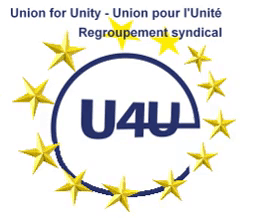European Parliament
Dignity and working conditions
The administration must ensure the well-being of all its staff, and in particular, those who are experiencing a significant increase in their workload. Solutions must be considered to ensure continuity in the quality of performance of tasks, a mark of excellence in the work of the staff of the Institutions, while guaranteeing realistic working rhythms, adequate tools and an adequate working environment. In particular, we consider that workspaces must correspond to the constraints and possibilities of the different professions. They must be set up with the agreement of the staff and their participation. This vision should apply to “open spaces" and "hot desks". We must resist the pressure to implement these spaces, at all costs for all, and under any conditions, to the detriment of efficiency and conviviality. In addition, it is necessary to think about different forms: hot desking in open space or hot desking in individual office ("hot office"). In addition, additional resources must be provided: our Institutions cannot take on more and more missions while accepting staff reductions;
For U4U, teleworking must be voluntary, flexible and variable. Team spirit, creativity, passing the baton, welcoming and integrating new colleagues go through the preservation of a job in the office. Adapted training will avoid digital overload and hyper-connectivity. Digital tools must be adapted both to the possibilities of hybrid modes, and to a more collective and participatory functioning of the different work teams. In addition, the generalization of telework raises the question of equal treatment between workers who are not subject to the same material constraints, including the reimbursement of at least part of the related costs;
Teleworking allows more flexibility in the workplace. U4U supports the possibility of teleworking “abroad" (away from the duty station) for at least three weeks, not related to leave. In addition, U4U is in favor of granting additional periods for detailed personal reasons. Finally, U4U is the only trade union organisation to advocate a mobility policy, including inter-institutional mobility, which allows family reunification; ▪ The professions and those who exercise them must be respected: this is true of assistants such as administrators, interpreters such as translators, building agents such as security guards... The quality of the service provided takes precedence over "productivity", especially when this is achieved to the detriment of our missions and the health of colleagues;
No colleague should be treated inappropriately by our institution, left behind or stuck in non-work. The European Parliament needs all its staff to work together in a constructive spirit so that the European Union can move forward;
Since we are working for longer periods of time in our life, our institution must prepare for this extension of working life, and this from the beginning of service. It must also better enable older colleagues to continue to progress, by continuing to train them and offering them careers that take into account their experience and merit;
In conclusion, U4U believes that Human Resources policy should be considered first, in itself, without depending on other policies. For example, teleworking must result from a reflection of Human Resources, and not from a real estate policy. As with all fundamental challenges to working conditions, and their possible consequences on the efficiency and well-being of staff, we ask that decisions taken in terms of hybrid modes of work, “open” spaces and flexi-desks are based on relevant analyses and in consultation with trade unions. Their implementation must always be followed by a regular evaluation, which will be the basis for an analysis to decide on possible corrective measures, in consultation with the trade unions. They cannot be rushed, for example to serve as a springboard for a real estate policy. They must not be done without the involvement of staff, and without seeking their support;
In the case of European Schools, nurseries and nurseries, sufficient provision of high-quality infrastructure and staff is essential. Indeed, to enable everyone to do their job well, it is important that a quality place for all staff children and reception hours compatible with the constraints of work are ensured;
Our union wants an intensification of social dialogue between institutions and trade unions, a better preparation of it by sending beforehand the texts to be discussed, which must be documented, and at the same time a broadening of the subjects to be discussed (e.g., EU budget and real estate policy). Similarly, once a year, trade unions should be able to propose to the social dialogue a non-predefined theme, left to their free choice. The employer would be required to organize a dialogue on this matter. Furthermore, for U4U, dialogue can also be organized directly between the institution and the staff itself through annual meetings by department, during which staff can propose topics for discussion that will then be discussed in the Staff Committee, and with the unions;
We also advocate a reform of staff representation.
On a daily basis, we accompany our demands with multiple concrete actions. U4U has set up several tools to help colleagues individually and collectively: coaching, training, preparation for competitions, personalized legal assistance, advice, support in the evaluation and promotion exercise and during meetings between colleagues and the hierarchy, conferences and debates on subjects of general interest (pensions, diversity, etc.). When circumstances permit, we also organize convivial events: exhibitions, concerts, meals, cultural walks ...
